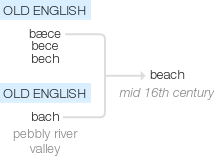Beach
mid 16th century (denoting shingle on the seashore): perhaps related to Old English bæce, bece ‘brook’ (an element that survives in place names such as Wis bech and Sand bach ), assuming an intermediate sense ‘pebbly river valley’.
wiktionary
From Middle English bache, bæcche(“bank, sandbank”), from Old English bæċe, beċe(“beck, brook, stream”), from Proto-West Germanic *baki, from Proto-Germanic *bakiz(“brook”), from Proto-Indo-European *bʰog-(“flowing water”).
Cognate with Dutch beek(“brook, stream”), German Bach(“brook, stream”), Swedish bäck(“stream, brook, creek”). More at batch, beck.
etymonline
beach (n.)
1530s, "loose, water-worn pebbles of the seashore," probably from a dialectal survival of Old English bece, bece "stream," from Proto-Germanic *bakiz. Extended to loose, pebbly shores (1590s), and in dialect around Sussex and Kent beach still has the meaning "pebbles worn by the waves." French grève shows the same evolution. Beach ball first recorded 1940; beach bum first recorded 1950.
beach (v.)
"to haul or run up on a beach," 1814, from beach (n.). Related: Beached; beaching.
